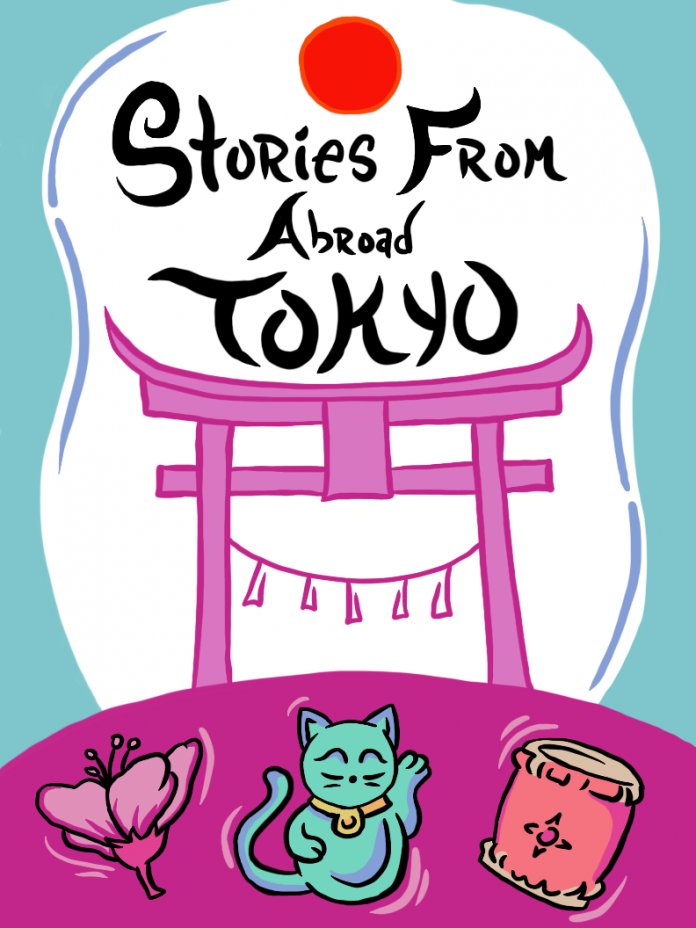When you reach a certain level of Japanese learning, it’s hard to imagine you have much left to cover in terms of grammar. But even if you have memorized every grammatical structure in the history of the language, you could still experience major trouble when you start talking to native speakers. If there’s one thing I’ve learned in my time abroad, it’s that I have a tiny vocabulary. It’s so very small. If someone asks me how to get to the library, or what my weekend plans are or what my hometown is like, I have them covered. But when I venture outside of these basic conversations, there are simply a lot more things I want to be able to say.
It’s only when you hear a language every day that you realize just how many words there are, and just how many of them that you don’t know.
I’ve recently returned from a three-month residence in Japan; not a long stay, but enough to have acquired a treasure trove of useful words from my new friends. These all came after the inevitable “teach me every dirty word in your language” conversation that comes from cultural exchange between college students, of course. But they’re no less interesting, and they’re safe to use in front of just about anybody.
ねぐせ
1. ねぐせ (neguse): bedhead. A good word for making excuses about why your hair doesn’t look good, but not a replacement for going out, braving the language barrier, and getting an actual haircut (sanpatsu). Although you might need a different list of useful vocabulary words for that encounter.
言葉の壁
2. 言葉の壁 (kotoba no kabe): language barrier, a word to describe the disconnect between speakers of different languages. In this case, it literally means “word wall.” A very useful phrase for foreigners and language learners of all kinds. When you talk about breaking the language barrier, you should use the word “taoreru” (defeated), and when you experience “kotoba no kabe,” you should try not to use “guguru honyaku” (Google Translate).
一口
3. 一口(hitokuchi): one bite. This one can be used two ways, one of them offering a bite of your food (hitokuchi taberu?), and the other one asking for a bite of someone else’s (hitokuchi tabete ii?). Both of them are incredibly useful when you’re visiting Japan, where I found I wanted a bite of just about everything.
萌袖
4. 萌袖 (moesode): cute sleeves. This is a word you would use to describe the phenomenon of girls putting their sweater sleeves down over their hands, something we English speakers might describe as “sweater paws.” It’s a fad popular mostly with high school girls, so it’s likely not everyone will understand what it means, and you’ll experience a variety of reactions based on the tastes of your conversational partner.
変顔
5. 変顔 (hengao): weird/funny face. This one I often heard when posing for pictures with people. Not to be confused with “henjin” (weirdo). My lack of understanding probably led to a lot of photos where I smiled plainly amongst a group of much funnier faces. Try shouting it at tourists when you take their picture.
低速
6. 低速 (teisoku): describing slow internet. Something you might experience a lot of with an international phone plan, and a good word to use so you’re not standing there bent over “guguru honyaku” for far too long when you just told your Japanese friend you were going to look up the Japanese word for “goosebumps” (torihada) and you’re doing it now, you swear.
遅延
7. 遅延 (chien): procrastination, literally meaning “delay.” A very useful word if you’re attending college in Japan. Another way of saying this might be “osokunaru,” or to make late, but “chien” is the proper word for it. No matter where you go in the world, you’ll find people procrastinating their work, just like I procrastinated writing this article until more than a full month after I came home.
黒歴史
8. 黒歴史 (kurorekishi): bad memory. Literally translating to “black history,” this is the word used to describe moments from your past that you don’t want to remember. I find that it’s most effectively used when talking about embarrassing childhood memories. Important to note, if you want to talk about Black History Month in Japanese, you’ll probably want to spell the whole thing out in katakana instead to avoid confusion (burakku hisutorii mansu).
千鳥足
9. 千鳥足 (chidoriashi): drunk walk. When you and your buddies go out to karaoke, and find at the train station that you’re feeling pretty wobbly, please stay as far as possible from the yellow line to avoid falling over the edge of the platform. The literal translation of this kanji is something like “one thousand bird legs,” which I think is outrageously funny. Used in a sentence, you could say “kare wa chidoriashi de aruku,” or “he walks drunkenly” (literally: he walks with the drunk walk).
レンチンご飯
10. レンチンご飯 (renchingohan): microwave food. I saved this one for last because it is my favorite, and also something that I ate a lot of as a dorm-dwelling student in the greater Tokyo area. But fear not, prospective travelers, because microwave food, convenience store food, even pre-packaged train station “bento” boxes — in Japan, all of this stuff is both convenient and delicious.

































[…] that Oriental American women of all ages reported experiencing hate incidents 2 . 3 times even more https://flathatnews.com/2020/01/28/japanese-words-to-impress-your-friends/ than men in 2018. This is a serious concern that needs to be addressed and can be prevented with a […]
[…] one is a bit debatable, but it could be said that Asian girls are https://flathatnews.com/2020/01/28/japanese-words-to-impress-your-friends/ not really into sporting activities like most additional women happen to be. They are more […]
[…] really generally very conservative when it comes to making other people have a clue how they look. https://flathatnews.com/2020/01/28/japanese-words-to-impress-your-friends/ They may hold back issues lustful urges and might just take a kiss or two the moment no one […]
[…] in Japan require significant time commitments, like likely to a restaurant or spending a whole https://flathatnews.com/2020/01/28/japanese-words-to-impress-your-friends/ day […]
[…] dates typically be longer https://flathatnews.com/2020/01/28/japanese-words-to-impress-your-friends/ and involve more engaging activities as compared to some other countries. Especially upon weekends, […]